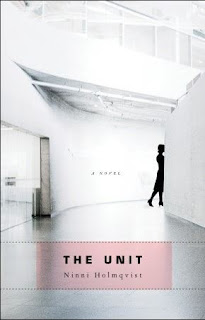This debut novel takes place in (presumably) very near future where the famously democratic nation of Sweden has implemented a new social policy. Designed to cut down the national cost of the elderly, the ill and the socially unproductive, all childless adults aged 50 for women and 60 for men are deemed 'disposable' and are taken to a facility called the Unit. At the Unit they can enjoy the best entertainment, leisure facilities, companionship, good food, theatre and comfortable living space, but they will be required to undergo constant medical tests (some harmless, some not so much) and ultimately to sacrifice their vital organs to those deemed to be 'needed' by society.
Dorrit has just turned 50. Intelligent but unsociable, an unpublished writer and all round bohemian, she has never married, never had children and never had a career that is considered to contribute to the nation's prosperity. She leaves her beloved dog, Jock, and her ramshackle house behind and signs her body over to medical science. The unit proves to be the only place in her life that Dorrit has met truly likeminded people, mostly 'pointless' intellectuals such as herself. Amongst the childless she is no social outcast, and now she has time and need for friendship. Her tragedy is that during her first week, she meets and falls in love with another resident who, had she met him on the outside she may have led a happy life with.
To begin with, I was convinced that this book was a Swedish re-hash of Never Let Me Go but with Borgen jumpers instead of boarding schools. I changed my mind. NLMG hides the true reason for the existence of the characters and of the school they attend- we understand it's not a normal school, but can't work out why. When its organ-farm purpose is revealed to the reader, the characters discover that there are organisations, such as their old school, working to determine the ethical implications of cloning and forced organ harvesting, and asking questions about what makes a person a true person and what makes one just a walking bag of spare parts. There's none of that here. We know from the beginning what the purpose of the unit is, and so does Dorrit. Society knows. The donors know where their organs go and the recipients know where they come from. It's the assumption that it's all fine and sensible and that it's the right thing to do because it's the economically sustainable thing to do that makes this book shocking.
The residents of the unit arrive shell-shocked and confused, they have outbursts throughout their stay of grief and rage as their friends and the people that they have fallen in love with within the unit are taken forever and recycled- but for the most part, they accept their fate. I think this is what intrigued me the most about these characters- the fact that they have lived in the outside world outside of social norms, but become so passive and so resigned within the unit. Are these people- artists, writers, poets- genuinely dissatisfied with their childless lives? Do they crave companionship and security? Are they really that conventional at heart? Do they really buy into the state's idea of the reuse of 'disposable' human tissue? Dorrit, faced with an unusual amount of options, decides her own fate in a very obvious way but the reasons for her choice are never confirmed in any real sense. The reader has a lot to consider when deciding what motivates the behaviour of the characters that they read about, which is a brave move on the part of the author.
I honestly did enjoy this book a lot, despite expecting not to. It's haunting, original and well written in a stylishly sparse way. I genuinely liked Dorrit and her friends; I felt the injustice of their social position acutely and hated the cruelty of the two-tier social system. Books like this prove that behind every supposed fictional Utopia there's some hidden (or in this case unhidden) horror that's necessary to keep the important people comfortable.
I look forward to discussing it at our meeting!


No comments:
Post a Comment